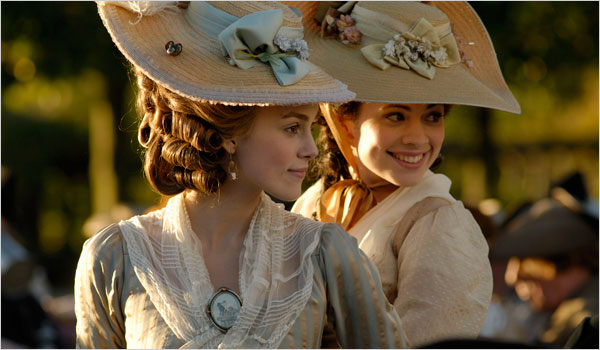Movie review by Greg Carlson
Keira Knightley fans anxious to see the talented performer in another sumptuous period melodrama will not be as disappointed as 18th century history buffs by “The Duchess,” a beautiful but largely inert costume ball helmed by Saul Dibb. Recounting the remarkable life of Georgiana Spencer Cavendish, who became the wife of William Cavendish, the fifth Duke of Devonshire, “The Duchess” makes up in production and costume design what it lacks in compelling narrative. What could have been a captivating tale of the intellectual maneuvering and gamesmanship needed for a woman to survive the oppression of a crushingly sexist era ends up a fairly average example of the genre.
As discussed by Amanda Foreman in her book “Georgiana, Duchess of Devonshire,” upon which the movie’s script is based, the young Duchess successfully navigated the challenging social and political worlds of the late 1700s while trapped and constrained in an unhappy match. The film is far less successful in balancing those two themes than was Georgiana, and most of the time the viewer’s attention is directed to the enormous pressure on the heroine to produce a male heir. The movie includes the horrific reality of marital rape, but avoids dealing in any complex manner with the particulars of the Duke and Duchess’ interpersonal day-to-day, beyond the suggestion that the man was cold, distant, and more interested in his dogs than his spouse.
While Dibb does manage to squeeze in a fair number of scenes based on anecdotal record, including a brief dramatization of Richard Brinsley Sheridan’s play “The School for Scandal,” the movie spends most of its duration focused on the title character’s marital discord and unfulfilled promise. The audience is reminded numerous times of Georgiana’s popularity with the public, but the film accomplishes very little in the way of explaining the convictions behind the young woman’s Whig Party beliefs. One extravagant dinner scene offers the tiniest glimpse of Georgiana’s rhetorical gifts, but too often the political takes a back seat to affairs of the heart, including the steamy, doomed flirtation between Georgiana and childhood friend Charles Grey (Dominic Cooper), who would become Prime Minister.
Arguably the most compelling angle of Georgiana’s story is the open ménage a trois completed by the Duke’s romantic entanglement with the Duchess’ friend and confidante Lady Elizabeth Foster (Hayley Atwell), who lived openly as the Duke’s mistress for a number of years. Even though the three shared a home, the movie neglects to explore the psychological impact of her husband’s affair on the Duchess in any depth, and blithely skips from Georgiana’s sympathy with her close friend to bitter jealousy without stopping to consider much of anything in between.
Knightley is as good as usual, but her dominance of the frame takes away screen time from several superb actors in supporting roles. While Ralph Fiennes is in fine form as the Duke, both Charlotte Rampling as Georgiana’s mother and Simon McBurney as Charles James Fox are never quite given the juicy scenes they deserve. The audience is left to imagine that the best parts of their conversations with Georgiana happened either just before or just after the scenes that were left in the film.
